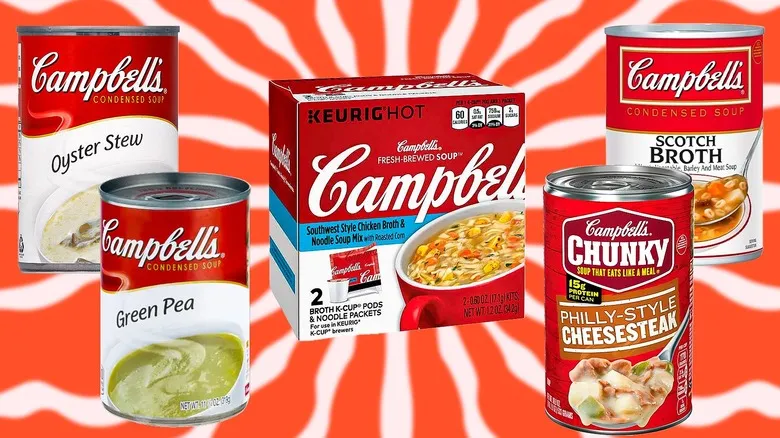Mock Turtle
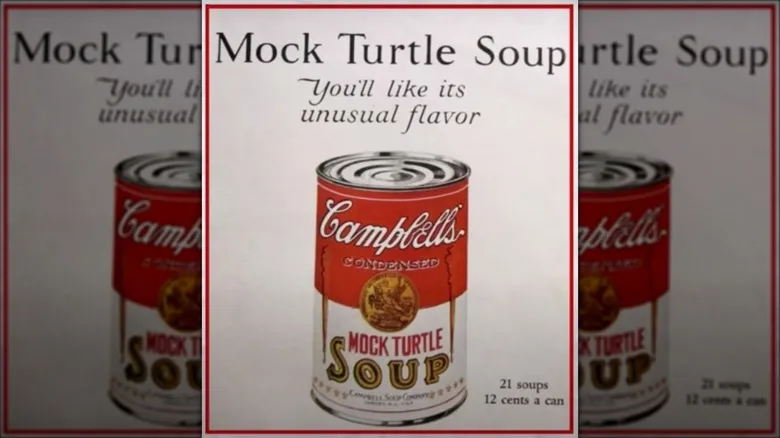
Although initially inspired by a once-elite delicacy, Campbell's Mock Turtle soup ultimately faded into obscurity—an ironic twist given that real turtles nearly faced extinction due to their role as a key ingredient in turtle soup. During the mid-19th to early 20th centuries, the upper class developed such a fondness for turtle soup that diamondback terrapins became endangered.
It was the era of Prohibition—yes, that Prohibition—and the creation of mock turtle soup that helped rescue terrapins from the edge of extinction. This was less about conservation and more about curbing the practice of adding sherry to turtle soup, but it proved effective nonetheless.
Mock turtle soup doesn't actually contain any turtle; instead, it is made from cow's head, feet, and various cuts of meat and offal. The texture and consistency of these ingredients are said to resemble turtle meat. By the early 20th century, Campbell's entered the market to capitalize on the sales potential of this upscale offering.
The soup giant crafted its mock turtle soup using cow's head, herbs, and a tomato base, distributing these gourmet products worldwide. The price was steep, making it accessible only to the affluent, despite it essentially being canned beef and tomato soup. By 1960, the soup had lost its luxurious appeal, leading the company to discontinue its production.
Scotch Broth
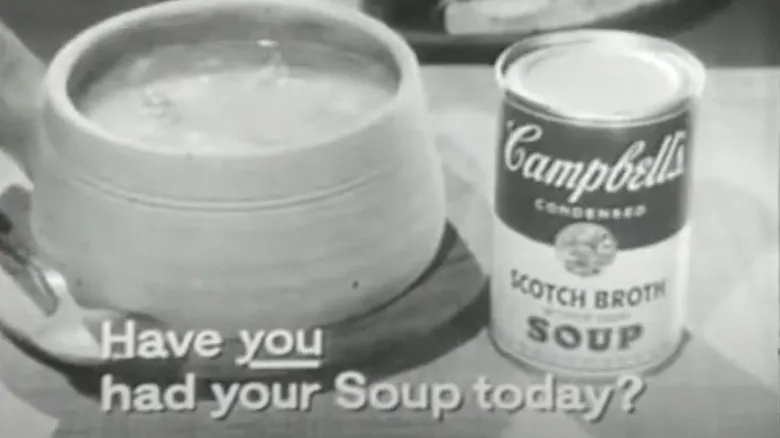
Scotch broth soup, also known as Scotch barley soup, has been a comforting dish for hungry diners since at least the mid-1700s. Traditionally prepared with mutton or lamb, it features a variety of vegetables such as celery, carrots, onions, turnips, and even raisins in some of the earliest recipes. This hearty soup was particularly beloved by fans of Campbell's products, with one devoted enthusiast claiming to have enjoyed it for over 40 years, as reported by The Sun. Such loyalty speaks to the soup's enduring appeal.
However, in 2023, Campbell's made the controversial decision to discontinue the soup, sparking an outcry among its dedicated followers. Fans urged the company to at least share a recipe for the beloved dish on its website. In response, Campbell's Canadian branch listened to the requests and now features a recipe for Scotch broth soup on a special site dedicated to recipes using Campbell's products. (Notably, this version calls for Campbell's beef broth.)
Regarding the decision to remove Scotch broth soup from store shelves, the company explained in a post on X (formerly Twitter), "We sometimes discontinue certain items to concentrate our efforts on upcoming offerings."
Oyster Stew
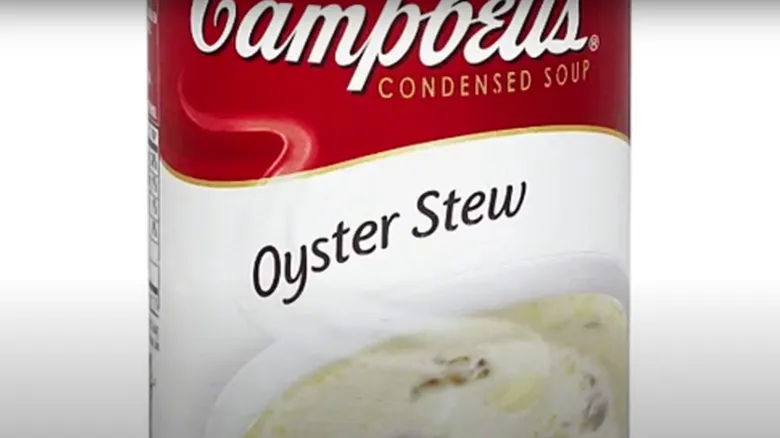
Discontinued in September 2012, Campbell's Oyster Stew was a rich, creamy soup reminiscent of mushroom soup, but featuring oysters instead. Perhaps fueled by the belief that oysters can alleviate hangovers, this creamy dish, often enhanced with a splash of lemon juice, became a popular remedy for those who had indulged a bit too much.
In June 2012, just a few months prior to the soup's removal from store shelves, Campbell's voluntarily recalled its 10.5-ounce cans of oyster stew due to concerns regarding the use of Korean oysters, which raised alarms about potential pollution levels. When Campbell's announced on its X account that it would be discontinuing the stew, no specific reasons were provided, leaving it uncertain whether the decision stemmed from declining sales, health issues, or other factors.
Today, the only remnants of the soup are broken links on various food websites, such as Walmart, and a 1969 poster created by Andy Warhol. Despite the obstacles faced by Campbell's Oyster Stew, there may be a case for its revival, at least temporarily, during Lent—a season when fish takes precedence over other meats. This, of course, hinges on the availability of safe oysters for Campbell's to source.
Green Pea
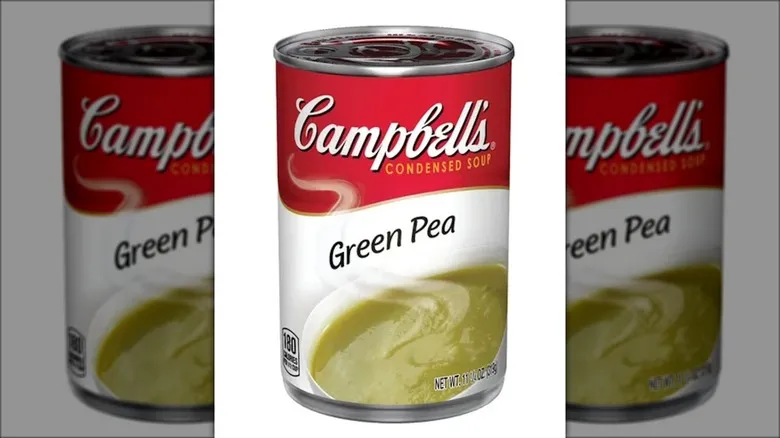
Fans of Campbell's Split Pea With Ham and Bacon Soup may view it as a suitable alternative to the brand's discontinued Green Pea soup. However, the inclusion of ham—likely the reason split pea soup enthusiasts enjoy it—might also explain why some long for the return of Campbell's Green Pea soup. With ingredients such as split peas, water, salt, flour, sugar, and a hint of onion and celery extract, along with butter, it is devoid of meat, making it an excellent choice for vegetarian soup lovers.
In response to a customer inquiry on X in 2019, Campbell's announced that it would no longer produce its Green Pea flavor. Instead, the soup giant suggested Habitant French Canadian Pea Soup, which is made with yellow peas and lard rather than green peas and butter. While the flavor may be close enough to please fans of green pea soup, the presence of lard disqualifies it as an option for vegetarians.
Pepper Pot
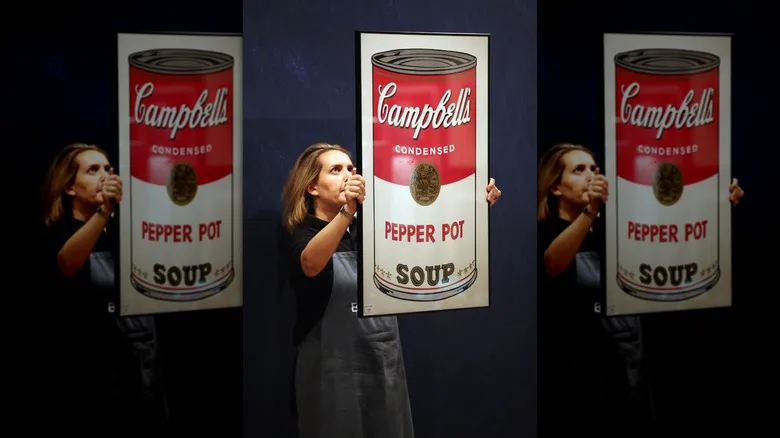
If soups could feel sadness over being discontinued, Campbell's Pepper Pot soup would at least find solace in having enjoyed a long and beloved existence before its end. After captivating fans for over a century, Campbell's abruptly removed the soup from store shelves in 2010. With hearty ingredients like potatoes, carrots, and aromatic onions, along with red pepper flakes and jalapeño peppers, it was a dish substantial enough to satisfy even the hungriest appetites. Featuring generous portions of tripe as its primary meat, the recipe offered a taste of the past from which it emerged.
Campbell's introduced the soup in 1899, following the rise in popularity of pepper pot soup, first in Philadelphia and later across the nation. The recipe has Caribbean roots, likely originating from the kitchens of enslaved individuals. It was a blend of African, European, and Native American culinary traditions, a dish often created to utilize leftover ingredients. While no formal recipe was necessary, Campbell's kindly shared the ingredients on its website for fans who wished to recreate the soup at home.
The decision to discontinue the soup stemmed from its waning popularity and the fact that the original recipe no longer aligned with contemporary tastes. Unfortunately, this reasoning offers little comfort to devoted fans who even traveled to Canada to enjoy the soup while it was still available.
Chunky Philly-Style Cheesesteak
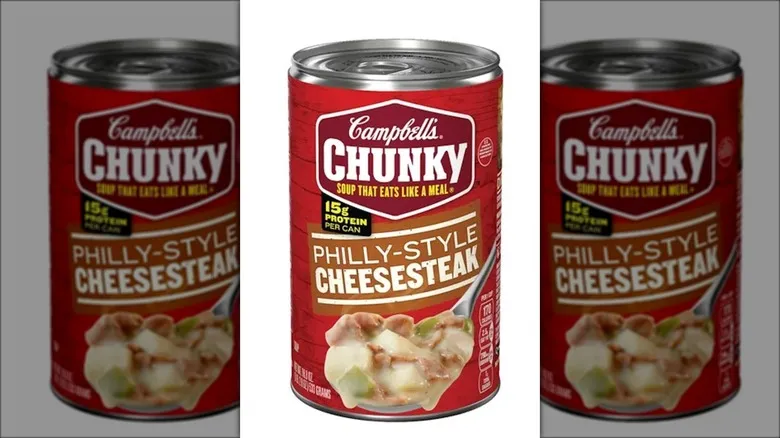
It's well-known that during the COVID-19 pandemic, many people hoarded canned non-perishable items, such as Campbell's soup. However, one specific flavor that didn't see a stockpile was the Chunky Philly-Style Cheesesteak soup. The reason? The soup company decided to discontinue this flavor during the pandemic to make space for other soups that were deemed more popular on store shelves.
This soup, which included all the classic ingredients of a Philly cheesesteak sandwich along with chunks of potatoes, was essentially a meaty, cheesy sandwich and fries in a cup. It was introduced by Campbell's as a specialty item under its Chunky brand in 2014 to commemorate Super Bowl XLVIII. As an official sponsor of the event that year, Campbell's launched the Philly-Style Cheesesteak soup alongside Spicy Chicken Quesadilla and Hearty Cheeseburger as part of its game-day festivities. The soup was even featured in a food truck at MetLife Stadium, serving up warm bowls to tailgaters as they awaited kickoff. Who would have thought that this robust Super Bowl soup would vanish from store shelves just six years later?
Ox Tail
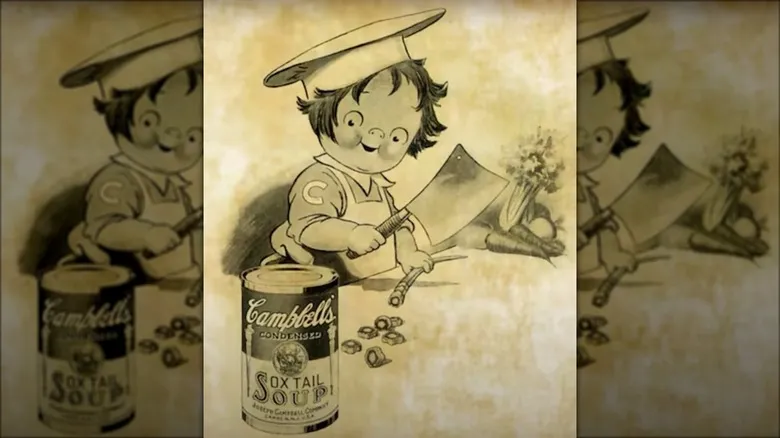
A 1922 advertisement for Campbell's Ox Tail Soup praised the soup's ingredients, which included a savory broth, carrots, potatoes, barley, tomatoes, and ox tails—described as "the very tenderest and finest the market affords," according to a sales page for a vintage soup ad listed on eBay. This nostalgic ad suggests that oxtail soup was once an economical way to utilize every part of the animal, especially since it was priced at just 12 cents a can at the time.
Although made from what might be considered less desirable cuts, the soup was likely quite delicious. Ox tail requires long cooking times to become tender, but its rich, fatty flavor makes the effort worthwhile. Variations of this recipe have been enjoyed for centuries, dating back to the 1700s, originating with Flemish and French immigrants in London before becoming a beloved and affordable dish for oxtail soup enthusiasts from Russia to South America.
Today, due to the ironic rise in status of ox tail as a delicacy within the farm-to-table movement, this once-common Campbell's soup would likely be a hit if it were available on store shelves. Unfortunately, that is not the case. Since at least 2011, many have been scouring their local stores in search of the soup, as noted in various online forums.
Hot Dog Bean
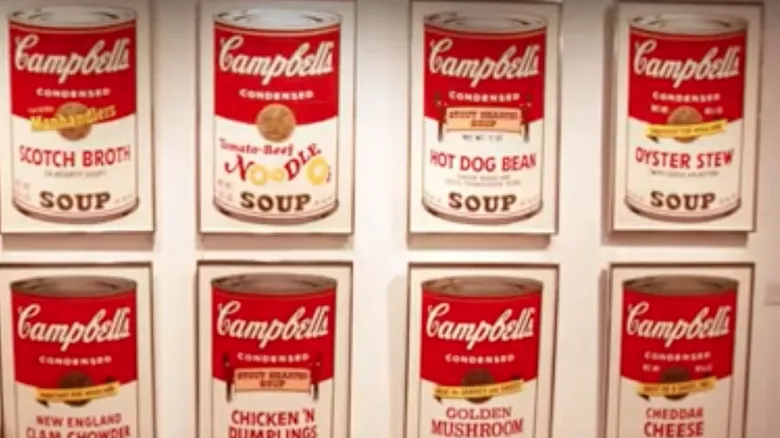
It seems that art enthusiasts have a greater appreciation for Campbell's Hot Dog Bean soup than the soup company itself. In 2013, an Andy Warhol collector purchased a 35-inch by 23-inch silk screen print featuring the iconic franks-and-beans soup, according to Altan Insights. Warhol originally created this artwork in 1969, and from his print, soup aficionados learned that it was described as a "stout-hearted soup" made with "tender beans and small frankfurter slices," as noted on a poster from the Revolver Warhol Gallery. With the soup no longer available, fans can only imagine its flavor when it was still being sold.
Despite its fame, largely thanks to Warhol's influence, Hot Dog Bean soup exited the market with surprisingly little fanfare. It's uncertain when the soup company decided to discontinue it. A quick look at the company's website reveals a variety of bean-based products, but that particular soup is nowhere to be found—it simply vanished. Without Warhol's artwork, the soup might have faded into obscurity without anyone noticing. Given the nostalgia it evokes, it would be delightful to see this soup make a brief return to store shelves.
Campbell's K-Cup Soups
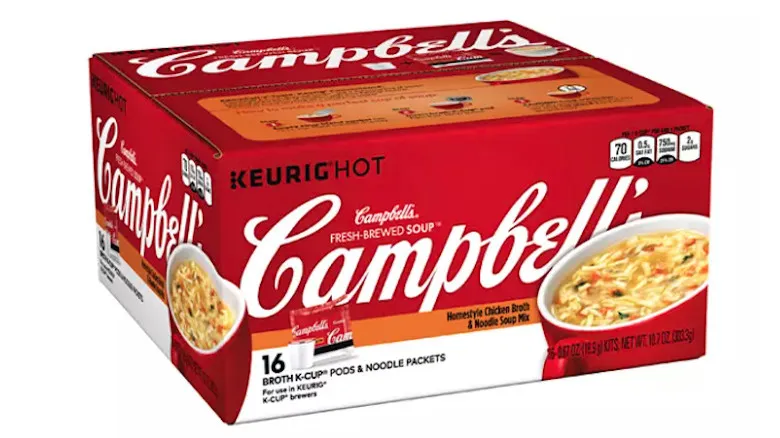
Fans of convenient coffee and soup likely had their expectations raised, only to be disappointed, when Campbell's teamed up with Keurig to introduce a cup of soup designed for coffee makers. However, it didn't take long for the idea (and the subsequent soup varieties) to fade away. The partnership and the launch of the mini soups were announced in 2014, but by 2016, the K-cup soups were pulled from shelves due to lackluster sales.
Although the concept was innovative, the bite-sized soups gave consumers pause. Many felt that the mini cups generated excessive waste, and the small portions didn't offer enough nourishment to sustain people throughout the day. While they were intended as snack-sized options, soup enthusiasts often attempted to use them for lunch.
Nonetheless, these mini soups might have gained more traction if the soup and coffee brands had targeted specific niche markets. They could have been an almost brilliant solution for those with limited cooking space, such as college students in dorms or individuals living in campers, as they required minimal equipment—just the K-cup soup, a Keurig coffee machine, and a spoon.
Recommended

Why Donuts Are Considered Breakfast Food In The US
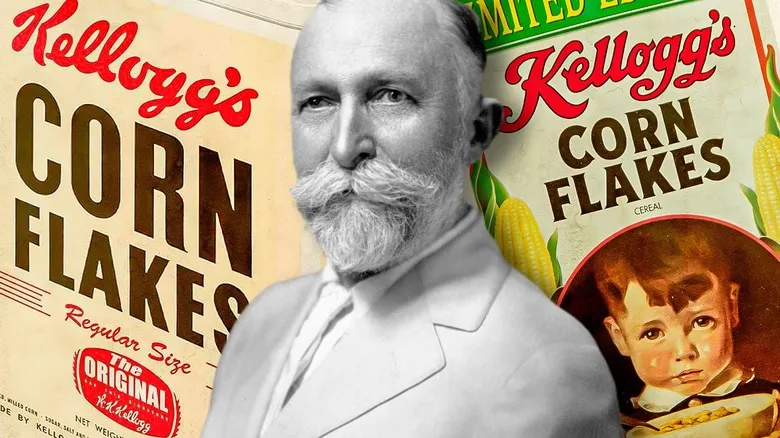
The Myth Behind The Invention Of Kellogg's Cereal

The Traditional Reasons Chinese Restaurants Have Round Tables

The Truly Ancient Origins Of Deviled Eggs
Next up

